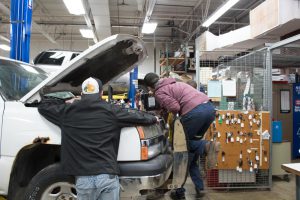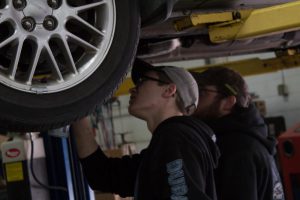By Lydia Hansen
Managing Editor
Lydia.Hansen1961@mb.rctc.edu

Automotive Mechanic students Jason Nelson and Logan Christopherson repair donated vehicles in preparation for the annual car sale, April 21-22. (Echo Photo by Isaac Sindt)
Looking for wheels?
Then you’ve come to the right place. RCTC’s Automobile Mechanic program might have just the ride for you at their car sale this April.
These are cars that have been repaired by the students in the program. Over the course of the semester, the students work on various parts of the vehicles, ensuring they are once again safe, drivable, and reliable.
“Safety is of utmost importance,” said Dave MacLeod, an Automotive Mechanic instructor of 17 years who organizes the program’s car sale. “We won’t sell a car until we are sure that the brakes and steering are all safe.”
The cars in the program that eventually appear in the annual sale are donated to the program, usually from community members unwilling to pay for necessary repairs.
“We don’t charge for labor, so we can do expensive repairs for just parts only,” MacLeod explained, adding that, “our cars are repaired to be dependable. Some programs will have cars that do not go out on the roads, so they’re not real repairs. You can learn from them, but we do live repairs.”
This arrangement is advantageousfor the program because cars can be fixed up and put back on the road without investing so much money in them. The proceeds from the sale of the cars then go back to the program to help fund further repairs, expansions to the program, and the tools and expensive equipment used by the students.
“It’s a win-win situation,” MacLeod says.
He pointed out that the car sale is a sealed bid sale, not a live auction. The vehicles will be available for public viewing at HB 124 in the Heintz Center auto labs from 1 p.m. to 7 p.m. April 21 and from 9 a.m. to 1 p.m. on April 22.
“You can bid on as many cars as you want,” MacLeod said, “but you don’t have to take any of them. The bid is not a binding contract. It’s just an offer.”

Automotive student Justin Brown works on a vehicle’s undercarriage while classmate Cody Johnson looks on. (Echo Photo by Isaac Sindt)
Public viewing ends on April 22, but the bidding window doesn’t close until April 25, giving people time to do research on the cars and make up their minds. On April 25, bids will be opened and the program will call the highest bidder on each vehicle to see if they’re still interested.
This year, MacLeod estimates there will be about 10 vehicles at the sale. This is about average for the program, though he said some years they’ve had as many as 30 vehicles.
“It depends on how many we have ready,” he said.
This can vary considerably from year to year, since repairs are only done as the students progress through the units of the program. Cars with bad transmissions, for instance, wouldn’t be repaired until they reached that unit.
In addition, after the vehicles have been repaired, the program has to hold on to them for a year before selling them, in accordance with various rules set by Minnesota State.
“Once we’ve met all of (Minnesota State’s) criteria and the cars are deemed good, reliable transportation, then we put them on a sale,” MacLeod said.
The price range for these vehicles is usually well within a student budget, with most going for about $1,000, though some range up to $5,000.
The kinds of vehicles available also varies a great deal. The Automobile Mechanic program works with whatever is donated, so one year there was an old ambulance at the sale, which MacLeod said he actually purchased himself for $25,000.
“One thing we see very seldom is pickups,” he said, “although we do have one that could be on the sale this year.”
If you’re in the market for a vehicle, stop by the car sale April 21-22. They might have just the car you’re looking for, repaired and ready for the road. And remember, it’s a sealed bid sale, so it’ll only cost you as much as you’re willing to pay for it.
